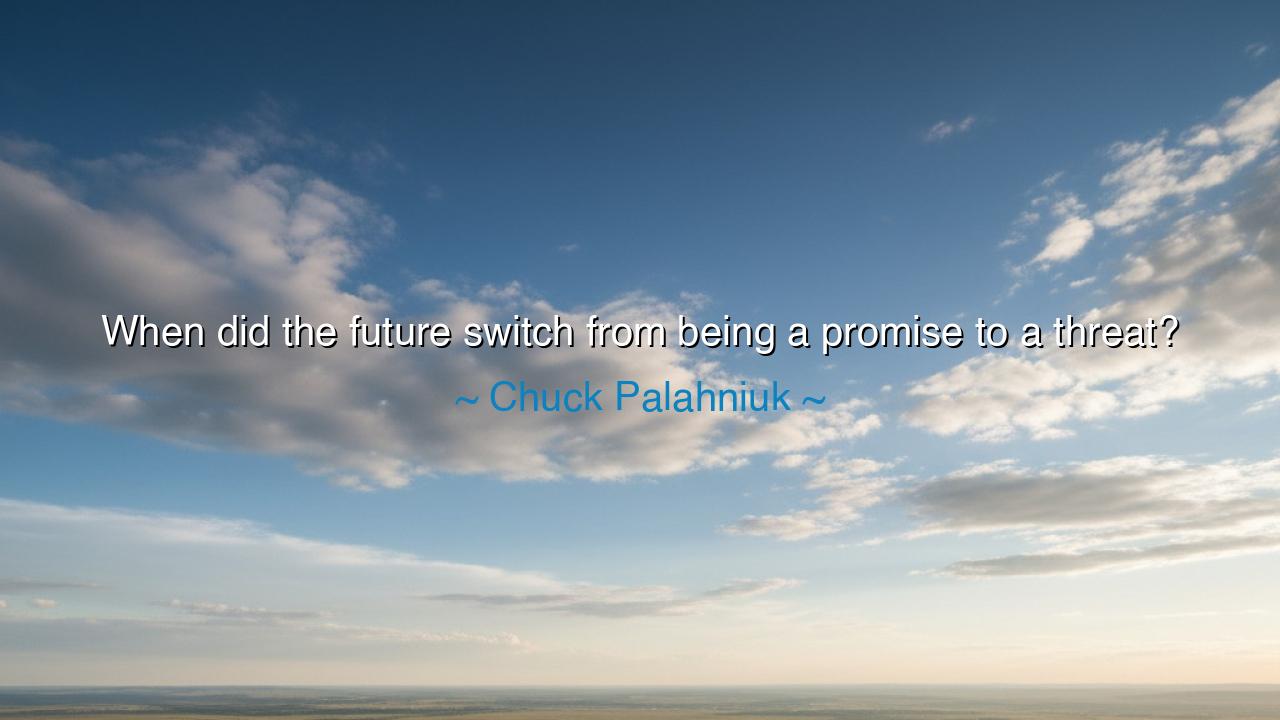
When did the future switch from being a promise to a threat?






"When did the future switch from being a promise to a threat?" These words, spoken by Chuck Palahniuk, cut to the very heart of human experience, reflecting the tension between hope and fear, ambition and despair. The future, once a realm of infinite possibility, has shifted in the eyes of many from a place of promise to one of uncertainty and even danger. Palahniuk’s words challenge us to reflect on the moment in time when the bright potential of what was to come became overshadowed by the burdens of modern life, the pressures of society, and the overwhelming speed of our existence. The future, once a dream of progress, now often feels like a looming shadow—a constant reminder of what we fear to lose or fail to achieve.
In the ancient world, the future was often viewed as a realm of hope and divine guidance. The Greeks, in their understanding of fate and destiny, believed that the future was shaped by the gods, yet it was not entirely beyond human control. Great leaders, philosophers, and thinkers like Socrates and Plato viewed the future with a sense of purpose—the idea that one could shape their destiny through virtue and wisdom. To them, the future was something to be embraced, a continuation of human progress that could be guided by philosophy, ethics, and the pursuit of truth. The future was a promise, a gift to those who strived toward knowledge and wisdom.
However, over time, the understanding of the future began to change. As societies became more complex and industrialized, the future started to feel more like an inevitable machine, moving forward with relentless force, with little regard for the individual. The Romans, too, experienced a shift in how they viewed the future, especially as their empire expanded and their political systems became more corrupt and distant from the common people. In this period of decline, many Romans began to fear the future, seeing it as a time of imperial decay rather than growth. The future was no longer about civic virtue and the advancement of society, but about the uncertainty of a crumbling empire and the threat of the unknown.
Palahniuk’s quote taps into this deep human fear—the idea that time is moving forward, but we are often moving backward. The promise of the future, once filled with possibilities, now feels like a threat as we witness the rapid changes in technology, politics, and society. The industrial revolution and the rise of modern capitalism brought about a new view of the future, one that emphasized progress but at a cost—often leaving individuals disillusioned, alienated, and feeling powerless in the face of vast societal forces. The future became less about personal growth and more about survival in a world that seemed to be moving too fast to keep up with.
Consider the story of Vincent van Gogh, a man whose own future seemed to be consumed by his inner turmoil. Van Gogh’s art was filled with the promise of expression, yet he lived in constant fear of an uncertain future. His letters reveal a man who deeply believed in the power of art to change the world, but he also felt the crushing weight of not being understood or appreciated in his time. Van Gogh's life is a stark example of how the promise of the future can become corrupted by doubt and despair, leading to a sense of hopelessness that overshadows one’s vision for what is to come.
The lesson from Palahniuk’s words is one that speaks to the core of the modern human experience: we must reclaim the future as a promise, not a threat. In our current age of uncertainty, where technology advances rapidly and societal pressures mount, it is easy to see the future as something to fear—a looming challenge filled with the unknown. However, we must remember that the future is shaped by our choices and actions in the present. Personal responsibility, vision, and hope can transform what seems like a threat into a new promise, a future where we can create meaning and purpose despite the turbulence of the world around us.
In your own life, ask yourself: how do you view the future? Do you see it as an opportunity to grow, to achieve, and to shape the world around you, or do you view it with fear, uncertainty, and resignation? The future is not set in stone—it is the result of how we choose to live today. So, let us not be passive observers of the future, but active participants, creating a life and a world where the future is a promise, not a threat. The choices we make now will shape the legacy we leave for those who come after us. Embrace the future with courage, and it will once again become the bright horizon of possibilities it was always meant to be.






AAdministratorAdministrator
Welcome, honored guests. Please leave a comment, we will respond soon